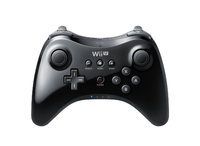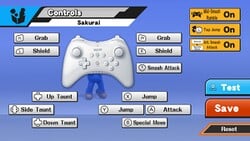| Welcome to SmashWiki! Log in or create an account and join the community, and don't forget to read this first! |
| Notices |
|---|
| The Skill parameter has been removed from Smasher infoboxes, and in its place are the new "Best historical ranking" and "Best tournament result" parameters. SmashWiki needs help adding these new parameters to Smasher infoboxes, refer to the guidelines here for what should be included in these new parameters. |
| When adding results to Smasher pages, include each tournament's entrant number in addition to the player's placement, and use the {{Trn}} template with the matching game specified. Please also fix old results on Smasher pages that do not abide to this standard. Refer to our Smasher article guidelines to see how results tables should be formatted. |
| Check out our project page for ongoing projects that SmashWiki needs help with. |
Wii U Pro Controller
The Wii U Pro Controller is a controller option for the Wii U, serving as an alternative to the Wii U GamePad without the extra screen. It can be either plugged in, or be used wirelessly.
The Wii U Pro Controller features two analog sticks, a D-pad, A, B, X and Y buttons, the L and R shoulder buttons, and two Z buttons (labeled ZL and ZR) next to the L and R buttons, respectively. Alongside the shoulder buttons are clickable analog sticks. In the center are + (Start), - (Select), Home, and Power buttons. This controller is one of several compatible with Super Smash Bros. for Wii U.
Compatibility[edit]
The Wii U Pro Controller has only been made officially compatible with the Wii U, as it was not made forwards compatible with the next-generation Nintendo Switch console. However, its optional wired connection allows the controller to be plugged in to other devices like a PC, making it unofficially compatible with games on those systems.
In for Wii U, the buttons on the Wii U Pro controller can be remapped in the Controls menu to perform other functions.
Standard controls[edit]
| Move | |
| Standard attacks | |
| Special moves | |
| Stick-smash | |
| Jump | |
| Grab | |
| Shield | |
| Taunt | |
| Pause | |
| Home Menu | |
| Nothing |
Technical data[edit]
Input lag[edit]
The Wii U Pro Controller has the highest latency out of all usable Smash 4 controllers barring the Nintendo 3DS, experiencing lows of 75.36ms (4.5 frames) and 93.7ms (5.5 frames). This makes it up to a frame slower than a Wii Remote or GameCube controller in some situations.[1]
In competitive play[edit]
The Wii U Pro Controller was the second most popular controller in Super Smash Bros. for Wii U after the GameCube controller. It effectively replaced the Classic Controller due to being more easily accessible for new players at the time, though some did not convert due to swearing by its lower latency. Its flexibility of being wired or wireless without the need for an adapter and being shaped more like an industry standard controller also made it enticing, though some complaints like the stick placement were prevalent.
References[edit]
| Controllers and buttons | |
|---|---|
| Nintendo 64 controller | |
| GameCube controller | |
| Wii Remote (and Nunchuk) | |
| Classic Controller | L |
| Nintendo 3DS | |
| Wii U GamePad / Pro Controller | L |
| Joy-Con | |
| Switch Pro Controller | L |
| Third-party controllers | Hori Mini Pad · Arcade controller · Keyboard |
| Other | Smash Controller · Controller modification |



